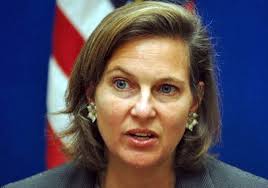
By James Carden, The American Conservative, 3/12/24
News came last week that, after a long and storied career, Victoria Nuland resigned as undersecretary of state for political affairs at the U.S. State Department. Over the years she gained a reputation as a neoconservative hardliner, having, among other roles, worked as a top aide to the anti-Russia hardliner Strobe Talbott; as national security adviser to Vice President Dick Cheney; and as spokeswoman for Secretary of State Hillary Clinton. Nuland’s reputation also derived partly (and perhaps unfairly) from the family into which she married. So there is an understandable temptation on the part of advocates of realism and restraint to breathe a sigh of relief over her departure from government service.
But one has to wonder: Does Nuland’s figurative defenestration actually matter?
Nuland deservedly got a lot of criticism (not least from this writer) for inserting the U.S. front and center into the geopolitical squabbles afflicting Ukraine. It is widely believed that before, during, and after the Maidan Revolution, she steered both the Obama and Biden administrations toward a more hawkish course than was advisable. But this perhaps inflates her influence; after all, both Obama and Biden have been plenty hawkish on their own on issues outside of Russia–Ukraine; just consider their actions in Libya, Syria, Yemen, and Palestine.
Informed speculation as to the import of Nuland’s resignation requires us to consider at least three questions:
- Where is the sausage made? In this regard, the current administration is little different from its immediate predecessors. Policy emanates from the National Security Council under the direction of the White House. By all available accounts, Biden national security adviser Jake Sullivan is primus inter pares among the president’s men. Antony Blinken’s almost sublime incompetence has required the president to send Sullivan, CIA Director William Burns, and the Israeli-American envoy Amos Hochstein as emissaries on sensitive diplomatic missions. To appreciate the extent to which State has been downgraded, this past summer, an up-and-coming member of the foreign policy establishment, Jon Finer, was floated as a possible candidate to fill the role of deputy secretary of state, the department’s number two position. Yet, in the end, he was deemed too valuable to leave his current position of deputy national security adviser. In other words, while Nuland occupied an esteemed position within the State Department hierarchy, the real decisions are made elsewhere.
- What do those who formulate policy actually think? That is relatively straightforward, since the president and his top foreign affairs adviser, Jake Sullivan, have told us repeatedly. Appearing on Meet the Press in late February, Sullivan expressed his view that “Ukraine still has the capacity if we provide them the tools and resources they need to be able to prevail in this war.” And the president, in a near perfect example of what George F. Kennan once mocked as “patriotic emotionalism,” used last Thursday’s State of the Union Address to compare Vladimir Putin, once again, to Adolf Hitler, declaring: “Overseas, Putin of Russia is on the march, invading Ukraine and sowing chaos throughout Europe and beyond. If anybody in this room thinks Putin will stop at Ukraine, I assure you, he will not. But Ukraine can stop Putin if we stand with Ukraine and provide the weapons it needs to defend itself.” Does it really seem likely, then, that the president and his advisers are going to gracefully withdraw from Ukraine now that Ms. Nuland is gone?
It doesn’t really matter who sits where when we’re talking about musical chairs.
The decisions are made by a small handful at the top. Has it ever been differently on the part of the hegemon — or any other nation?
https://usrussiaaccord.org/team-member/james-w-carden/
John Hopkins vs. Columbia, both are deep state but I see Columbia as more CIA/NED focused, where as John Hopkins is more State Department, at the end they both want to overthrow Russia’s Central Government and only differ in their relative paths to corruption/self-benefit while (not actually) achieving the desired outcome.